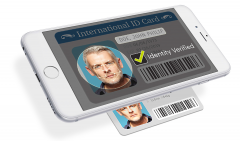Much has been said lately about the pros and cons of digitalising know your customer (KYC) and customer identification programmes (CIP) in today’s digital-first environment. Customers expect the same levels of convenience, speed, and delight they enjoy from e-commerce and other digital native platforms to extend to their day-to-day activities, from enrolling with new services to opening bank accounts, wiring money back home, or purchasing a house. Although willing to satisfy this appetite for all things digital, financial services providers still need to implement all the pertinent mechanisms to mitigate the rising risk of fraud while abiding by ever stringent Anti-Money Laundering (AML) regulations.
Sarah Clark, Mitek’s Identity General Manager, joined renown experts in identity federation, management, and access to address how the newest AML regulatory developments such as the AMLD4.1 or the upcoming and more targeted PSD2 pave the path for a better and more agile relationship between regulators and financial services providers.
Other topics discussed were how to keep a competitive edge and still be compliant, banks, prepaid card operators, digital currency processors, exchanges, and wallets are being compelled to embrace the digitalisation of traditionally cumbersome processes such as customer due diligence and ongoing authentication.
You can revisit the on-demand webinar ‘Digital KYC in the Online Era’ and get expert insight from Don Thibeau, Chairman & President at The Open Identity Exchange (OIX), Fintan Byrne, Head of Risk & Compliance at CurrencyFair and David Rennie, lead at the Identity Assurance Programme, UK Cabinet Office, as well as Mitek’s Sarah Clark.
From federated identities to mobile ID verification, today’s preferred options
 The panel also disucssed the shift towards regulations that incorporate technology and the use of digital channels as the key enabler for faster, securer, and more engaging customer identification programmes and know your customer mechanisms.
The panel also disucssed the shift towards regulations that incorporate technology and the use of digital channels as the key enabler for faster, securer, and more engaging customer identification programmes and know your customer mechanisms.
Don Thibeau acknowledged during his introduction that financial institutions need to successfully simplify KYC within their policies, procedures, business models, and technology infrastructures. Furthermore, financial services providers need to optimise the digital channels for further security and convenience,
“Federated ID system are driven by the users; the customers need to assert trusted identity credentials for online use,” said David Rennie, summarising the UK government identity assurance flagship initiative: GOV.UK Verify. GOV.UK Verify brings together private identity providers with governmental agencies.
Asked about how this system can be painlessly adopted and implemented by the private sector – Rennie anticipates banks and other financial institutions will adopt GOV. UK Verify in the next 6 to 12 months – Sarah Clark highlighted that in Mitek’s experience with helping the digitalisation of these identity verification processes, the step of proving identity can be achieved seamlessly in the digital channels by using an identity document.
“The market is moving away from third party verification and Knowled-based Authentication or KBA. We are witnessing a shift from what you know to what you have or what you are authentication methods. These are more secure, more user-friendly ways for onboarding.”
Helping this paradigm shift is the increasing number of data breaches, which has prompted a wave of scepticism towards old-fashioned passwords and KBA security questions. There is therefore a clear paradigm shift from ‘what you know’ to ‘what you have’ and ‘who you are’. “For example, using technology such as ours, you can use the camera on your smartphone to scan your government-issued ID. Then you can also take a selfie with your smartphone so not only the ID or ‘what you have’ factor can be authenticated, but also it can be tied to the individual who already owns that mobile device in a more user-friendly way,” emphasises Sarah Clark.
What are the key challenges and top priorities for financial services regarding digital KYC?
It’s all about “making it easier to people to prove their identity by high standards,” pointed out Rennie. But, what are the challenges and priorities for both the public and private sectors in tackling the digitalisation of KYC?
Although ground-breaking, the UK Government federated identity system creates a number of challenges, being the biggest how data is already available in the market and how credit agencies are currently able to verify their identity high standards. “Banks can verify between 30% and 90% of customers that way (using credit reference agencies). However, in a digital age. I, as a user, want to be able to assert my identity every time, online, and instantly to carry on with my desired transaction.”
On a related note, Thibeau pointed out that “The dynamics within regulatory environment have driven companies to a new set of approaches and new technologies. But, how do we manage risk, how do we manage compliance and how is the government responsive to the growing concerns of the public in regards to the security of their personal information?”
As per the security built in this federated identity system, the Identity Assurance lead from the UK Cabinet Office explained that “Once their identity has been registered, the citizen can be assured that none of the evidence presented to assert their identity will be shared at all.”
Both Rennie and Fintan Byrne coincided on stressing the enormous quantity of due diligence hurdles financial institutions need to go through to find a valuable provider.
“We are seeing more banks coming to the market solving the equation with compliant, streamlined, user experience-driven solutions which allow for digital onboarding to be completed in 5 minutes or less,” noted Sarah Clark from Mitek.
“Opening an account in 5 minutes or less” is definitely the shared goal for financial services providers in the UK, concurred Byrne.
The good news? “Regulators are quite progressive and explicitly embrace digital means of identity verification in regulations such as the latest Anti-Money Laundering Directives,” added Mitek’s Identity business general manager.
You can access the on-demand webinar from this link.